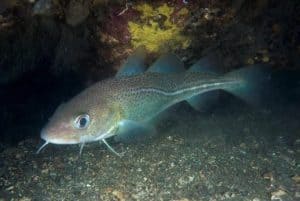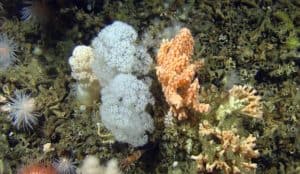Trænarevet and Vestfjorden map - photo Mareano
In October, the Solberg government opened exploratory drilling for oil and gas close to the unique Trænarvet.
By: Ørjan Holm
The Træna reef is a unique coral reef consisting of cold-water corals. Cold-water coral reefs are known for their great biodiversity. During drilling, there is a chronic release of chemicals and drilling mud. This is a constant threat to both coral reefs and the other marine ecosystems. An acute discharge could cause major damage to seabirds, fish eggs and fry in the Vestfjorden and Lofoten, the cod's birthplace.
On 28 October, the Solberg government opened exploratory drilling for oil and gas at the Toutatis well in the Norwegian Sea. The exploration well is located in an area that has been opened for petroleum operations in Nordland V in the Norwegian Sea. The block was incorporated into the scheme with allocation in pre-defined areas (TFO) in 2011. Toutatis is located approximately 7.5 km south of Trænarevet and approximately 83 km from Røst. The block borders the petroleum-free area at Røstbanken and Lofoten. NMF is extra negative about this allocation because it is so close to and "downstream" from the unique and extremely valuable rearing and spawning areas in Lofoten, Vesterålen and Senja. All emissions, both planned and continuous production emissions and any major unforeseen emissions, will be carried with the flow directly to where they cause the most damage.
It is completely unacceptable that the government allows exploratory drilling so close to the cold-water corals on Trænarevet and the fishery resources found in connection with the Vestfjorden.
The value of the fishing industry in Norway's and perhaps the world's most productive rearing and breeding area for cod is sidelined and gambled here, in favor of yet another oil extraction the world cannot tolerate or need. Today's government blames the red-green government that once opened exploratory drilling in the field. NMF believes that the Solberg Government could have stopped this exploratory drilling on an independent basis. Increased knowledge of the marine ecosystem in the vicinity and the consequences of acute and chronic discharges from the well should have stopped this. The exploration drilling and any future production takes place in connection with the Vestfjorden, Lofoten, Vesterålen and Senja, the cod's birthplace. The Vestfjord with Lofoten, Vesterålen and Senja is a spawning area for the north-east Atlantic cod population, which means that large quantities of fish eggs, fry, seabirds and marine mammals can be found in the area for most of the year.

Cod - photo: Erling Svendsen
Chronic emissions
The authorities seem not yet to have understood that it is not only a question of acute discharges, but also chronic discharges of, among other things, oil-produced water, oil products, chemical products, drilling cuttings and other waste. Or, one could argue that the governing authorities simply do not care. Their own departments have indeed used a wide range of arguments, all of which seem to have been completely overlooked. The continuous emissions of a wide range of harmful chemicals, oil products, drilling cuttings and other waste will affect the food chain in the area for a long time, and like most other environmentally harmful emissions will begin to migrate into the food chain. What consequences do these chronic discharges have on fish eggs, fry and coral reefs? And what consequences do the emissions have on the various links in the food chain, where, after all, humans are at the top?

Cauliflower coral – photo: Mareano.no
Irresponsible
NMF believes the government's decision to open exploratory drilling in the area is directly irresponsible. The government then chooses to overlook the perennial fishery resources found in connection with the Vestfjorden, Lofoten and Vesterålen. Chronic and possibly acute discharges will have serious and long-lasting consequences for fishery resources. The coastal current will carry the pollution directly into the Vestfjorden. This will in turn lead to consequences for both the fisheries, seabirds and marine mammals. NMF continues its work towards more oil activities, and is adamant that the time to look for new oil is over. It must be recognized that we have already found more oil than we can use, and should start reducing both consumption and production as soon as possible.



